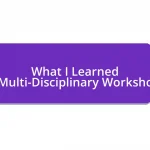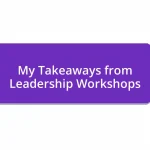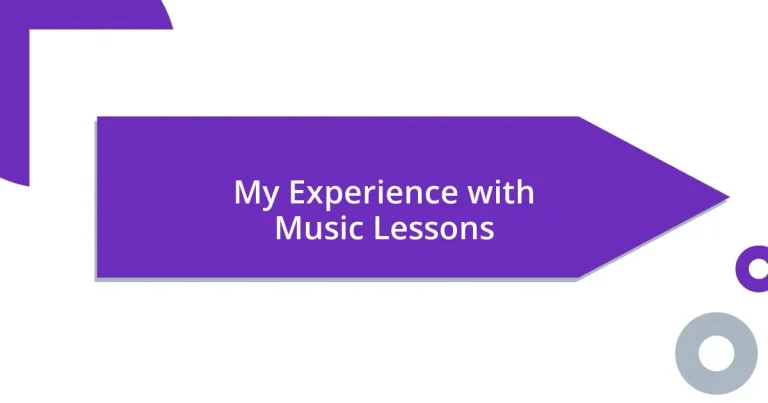Key takeaways:
- Initial excitement and self-discovery through music lessons, highlighting emotional expression beyond technical skills.
- Importance of selecting the right music teacher who inspires and personalizes learning based on student interests.
- Setting realistic goals increases motivation and satisfaction; breaking down complex tasks into smaller milestones is essential.
- Consistent practice fosters both technical growth and emotional connection, serving as a therapeutic outlet during challenging times.
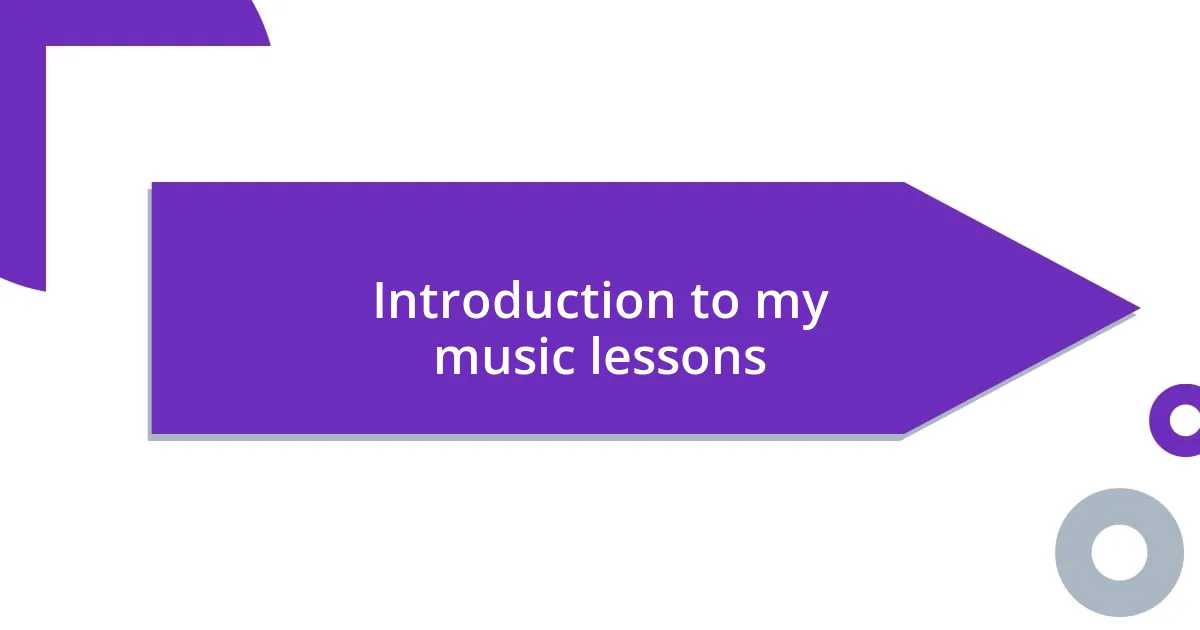
Introduction to my music lessons
When I first stepped into my music lessons, I felt a twinge of excitement mixed with trepidation. Would I be able to grasp the complexities of music theory, or would I struggle to even hold a note? That initial sense of uncertainty quickly transformed into a journey of self-discovery that I never anticipated.
I remember my first lesson vividly. My teacher handed me a guitar and strummed a few chords. As the sound resonated in the air, I felt a palpable connection between myself and the instrument. It was as if I had opened a door to a world filled with rhythm, harmony, and endless possibilities. Has there ever been a moment in your life where everything seems to click into place? That’s what it felt like for me.
What truly struck me, however, was not just the technical skills I was learning, but also the emotional depth that music unlocks within us. Each lesson was an opportunity to express feelings that words often fail to capture. I often find myself pondering: How can mere notes convey such profound emotions? The answer lay in those lessons, where every practice session became a dance between frustration and triumph, joy and vulnerability.
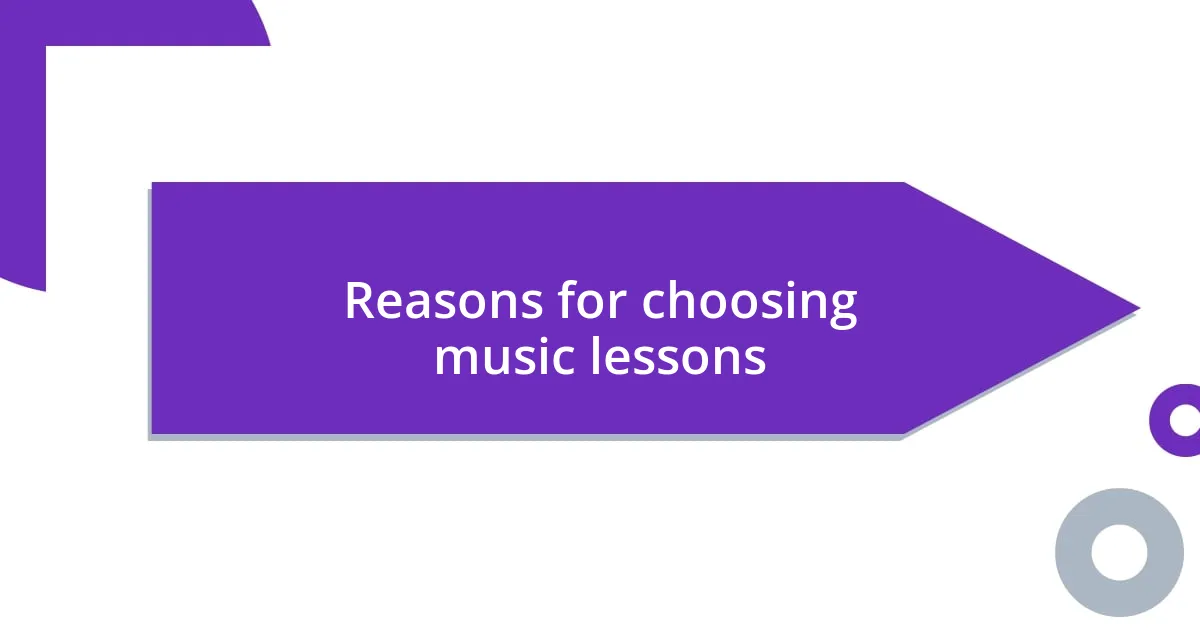
Reasons for choosing music lessons
Choosing to take music lessons can be a life-changing decision for many, myself included. I vividly remember wanting to express my emotions through a medium that felt authentic. The ability to create something beautiful and unique, to communicate feelings without uttering a single word, was incredibly appealing. Music lessons offered me not just a skill, but a voice.
Here are some compelling reasons why people might choose music lessons:
- Emotional Expression: Music allows for an emotional outlet, helping to process feelings.
- Cognitive Benefits: Learning an instrument enhances memory and critical thinking skills.
- Creativity: Music encourages creative thinking and problem-solving.
- Discipline and Patience: Regular practice fosters patience and resilience in facing challenges.
- Social Connections: Joining music groups or classes leads to new friendships and collaboration opportunities.
I found that every lesson brought a new challenge, and with it, a rewarding sense of accomplishment. The thrill of nailing a difficult passage or mastering a song was addictive. Each step in my learning journey not only honed my technical skills but also built my confidence in sharing my music with others.
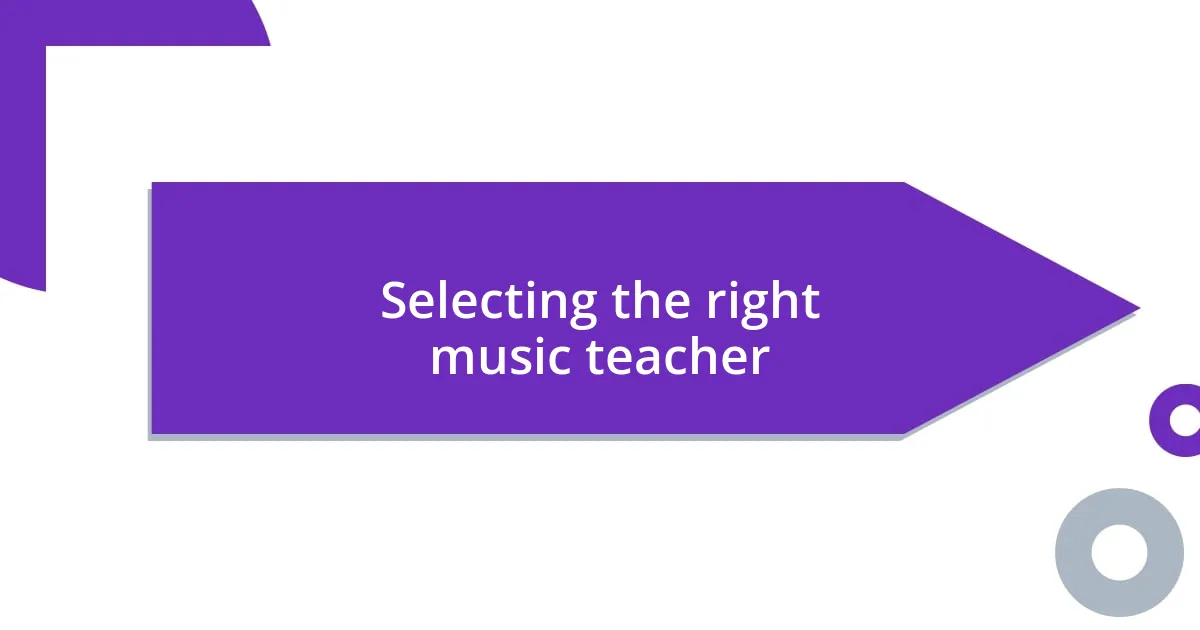
Selecting the right music teacher
When it comes to selecting the right music teacher, I think the connection between student and teacher is crucial. I remember meeting a few candidates before finding the perfect match. One, in particular, was incredibly knowledgeable but lacked the ability to communicate effectively. It’s vital that a teacher not only plays well but can also inspire and demystify the learning process for their students.
Price and experience play a role, too. While some teachers offer competitive rates, I realized that investing a bit more can lead to significantly better lessons. My eventual teacher had years of experience performing and teaching, which enriched my learning journey immensely. I learned that the passion a teacher exhibits often translates to their students, making the lessons far more enjoyable and impactful.
Another important factor to consider is the teacher’s approach to learning. I had a teacher who structured her sessions around our interests rather than sticking rigidly to a curriculum. This personalized approach left space for creativity and encouraged me to explore my musical preferences. Finding someone who listens and adapts to your needs can truly transform your music-learning experience.
| Criteria | Considerations |
|---|---|
| Connection | Choose a teacher who inspires and communicates well. |
| Experience | A teacher with a rich background enhances the learning experience. |
| Personalization | Opt for flexible teaching methods that cater to your interests. |
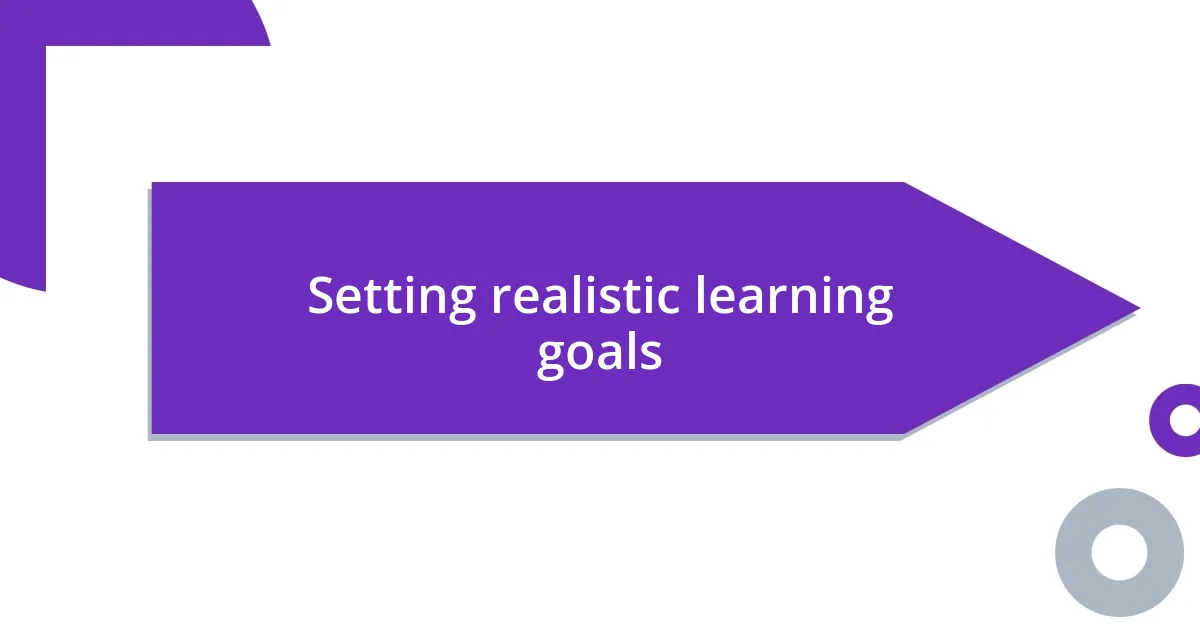
Setting realistic learning goals
Setting realistic learning goals in music lessons is crucial to maintaining motivation and enjoyment. I remember my early days of learning the guitar, setting lofty goals like playing a complex solo within a month. When I didn’t achieve this, my frustration diminished my passion. It was a wake-up call for me to recalibrate my expectations and focus on smaller, achievable milestones.
I learned that breaking down my goals into manageable parts made a world of difference. For instance, instead of aiming to master an entire song, I focused on perfecting a few measures at a time. This approach not only kept my enthusiasm alive but also built my skills incrementally, which was incredibly satisfying. Have you ever felt overwhelmed by ambition? I found that celebrating those small victories made me eager to tackle the next challenge.
Setting goals should also reflect your interests and strengths. I once had a goal to master jazz improvisation since I admired it greatly. However, I soon realized that my heart lay in classical music. By aligning my goals with my genuine interests, I found deeper fulfillment and excitement in my practice. It’s essential to ask yourself what truly inspires you, as this will guide you to set goals that resonate personally and make your learning journey enjoyable.
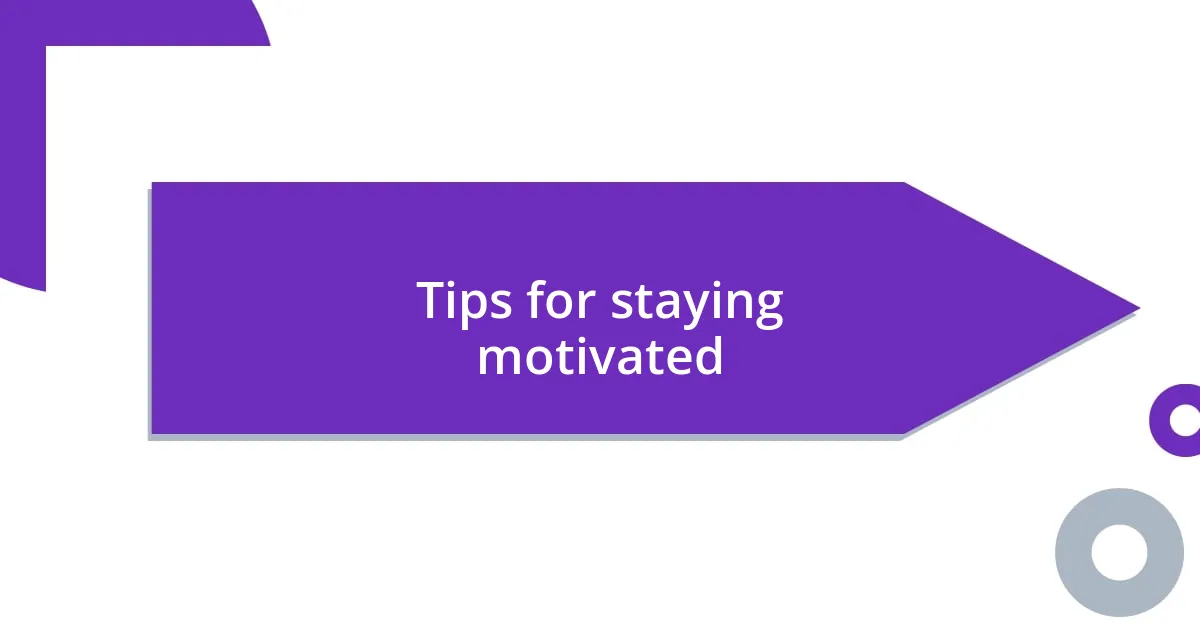
Tips for staying motivated
Staying motivated in music lessons can sometimes feel like a dance with commitment. One of the best strategies I discovered is to keep my practice space inviting. For instance, when I filled my room with instruments, sheet music I loved, and even some inspiring decor, I felt a surge of creativity each time I walked in. Have you ever thought about how your environment affects your mindset? A cozy, stimulating space can make you want to dive into practice every day.
Another tip is to incorporate your favorite songs into your practice. I vividly remember integrating pop songs that made me tap my feet. Instead of slogging through boring exercises, I’d spend time figuring out the chords to my favorite tunes. It kept me engaged and transformed my practice sessions into something I genuinely looked forward to. It’s amazing how a little personal flair can reignite that passion!
Lastly, I found accountability can be a powerful motivator. Joining a local music group or simply sharing my progress with friends made a world of difference. I recall a time when I set a mini-recital with some friends. Knowing I had to perform pushed me to practice consistently, and the camaraderie made the process so much more enjoyable. Do you have someone you could share your music journey with? Creating that support system can help you stay motivated and foster a sense of community in your musical endeavors.
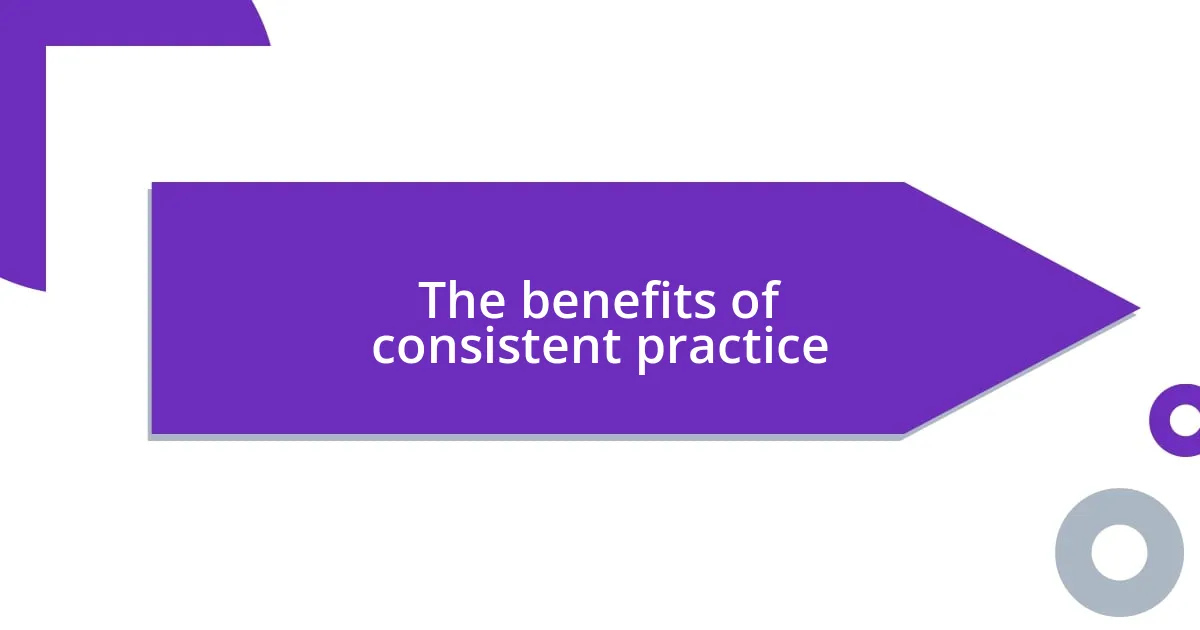
The benefits of consistent practice
I wholeheartedly believe that consistent practice is the secret ingredient to musical growth. I can vividly recall a time when I committed to daily practice, even if it was just for 20 minutes. The accumulation of those minutes transformed my abilities faster than I could have imagined. It’s like watering a plant—every drop counts towards that vibrant bloom.
When I think about the benefits of regular practice, I can’t help but reflect on muscle memory. After weeks of diligently working on scales, those finger movements became second nature. I remember the thrill of playing a piece flawlessly without thinking too much. Have you experienced that “aha” moment when everything clicks? It’s that feeling that keeps you coming back for more, almost like a delicious cliffhanger in a favorite book.
Moreover, consistent practice has a profound emotional impact. I often found solace in my instrument during stressful times. Just last winter, when I was grappling with some personal challenges, I discovered that immersing myself in music provided an escape. Is there a connection between your feelings and your music? I truly believe that regular engagement with your instrument can serve as a therapeutic outlet, helping to navigate life’s ups and downs while deepening your relationship with music.
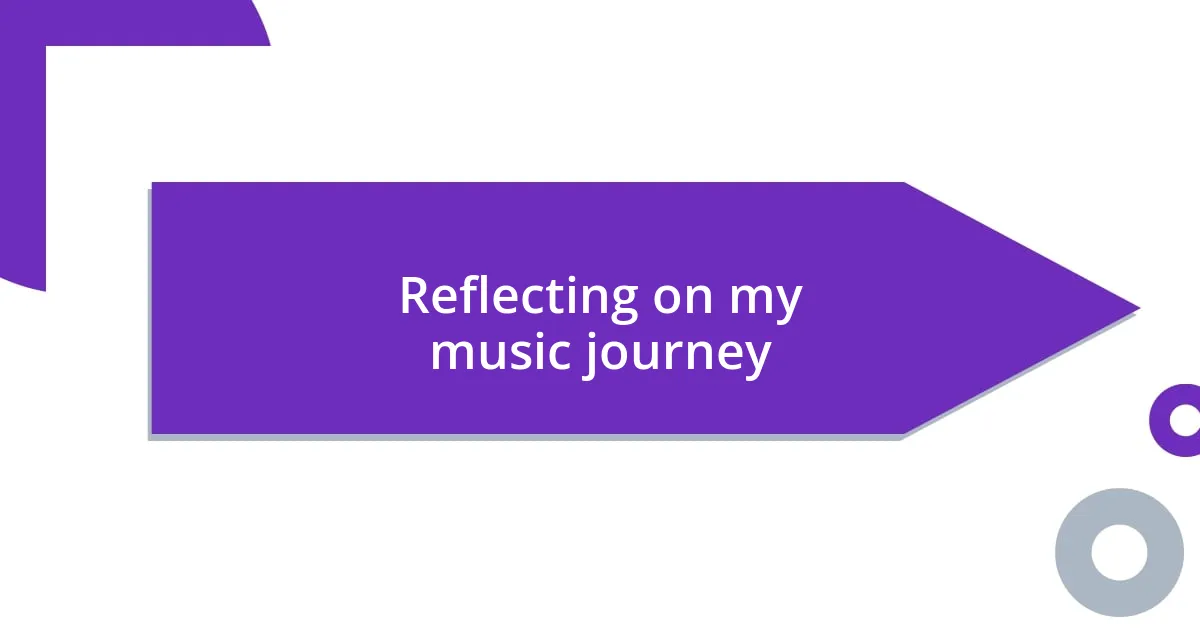
Reflecting on my music journey
Reflecting on my music journey brings back a whirl of emotions and memories. I remember my first lesson vividly; the mix of excitement and anxiety was palpable. Holding that instrument for the first time, I couldn’t help but wonder if I’d ever master it. Have you ever felt that initial thrill paired with self-doubt? It’s a unique blend that stays with you, shaping your path as you grow.
As I progressed, each milestone felt monumental. I think of the time I first played a song all the way through without stumbling. The simultaneous rush of pride and relief was unforgettable. That moment taught me that every small achievement contributes to the bigger picture. It makes me question—what small wins have shaped your journey? Those little victories often become the stepping stones that lead us to greater accomplishments.
Looking back, I realize music has influenced so much more than just my technical skills. It’s improved my confidence in ways I never anticipated. I recall performing at an open mic for the first time; my heart raced and my hands were clammy. But when the first note fell from my fingers, I felt an unexpected sense of freedom. Can you relate to that adrenaline high of stepping outside your comfort zone? Those experiences have become invaluable, reinforcing my belief that music is not just about notes and rhythms; it’s about personal growth and connection with others.
